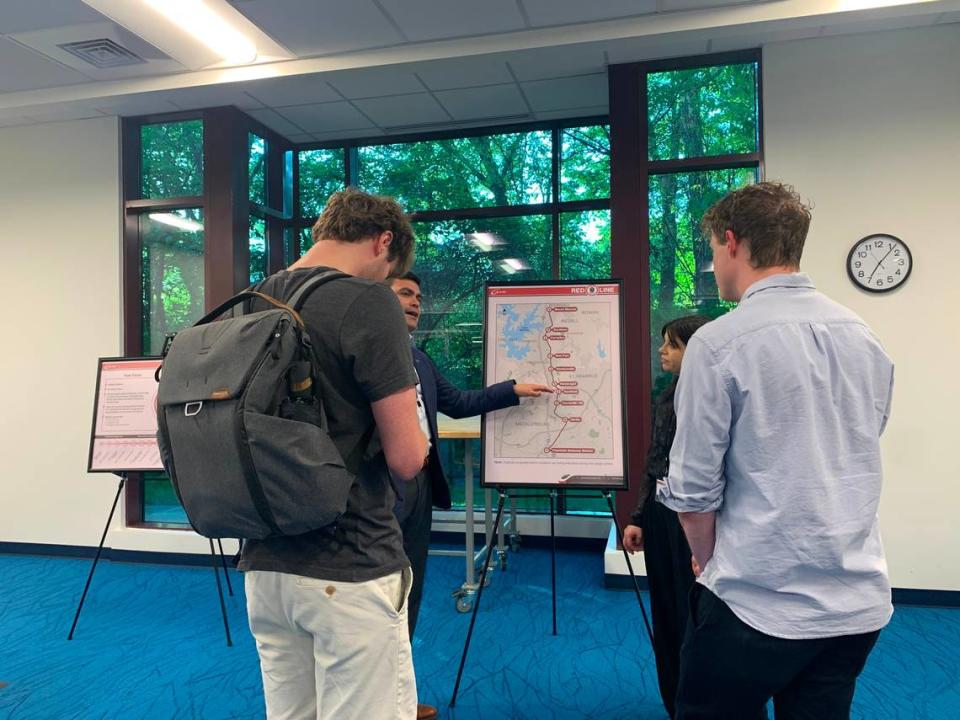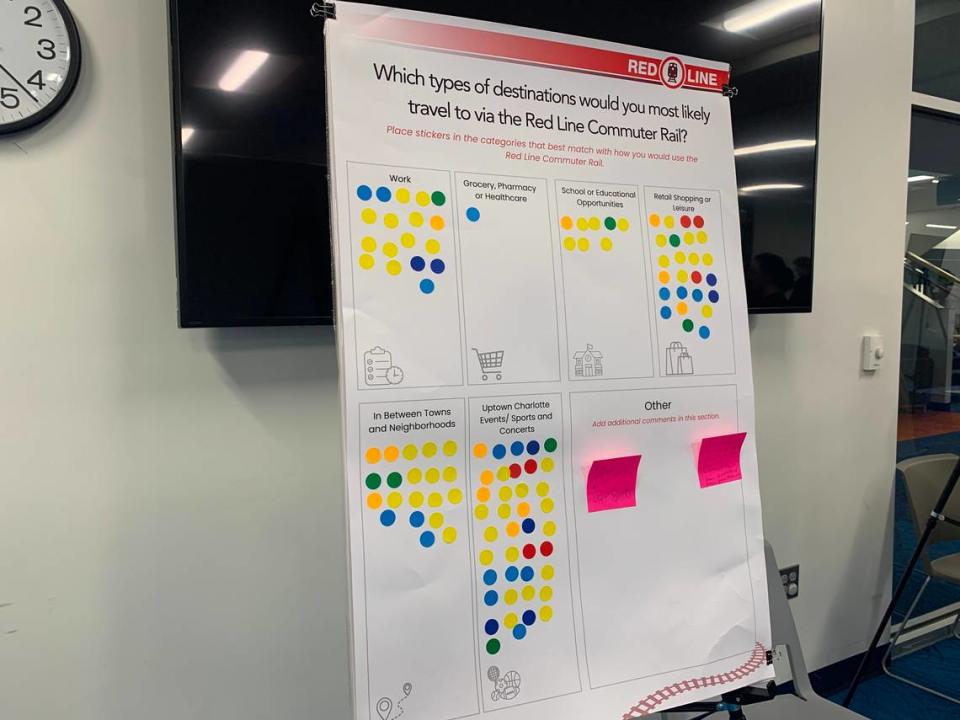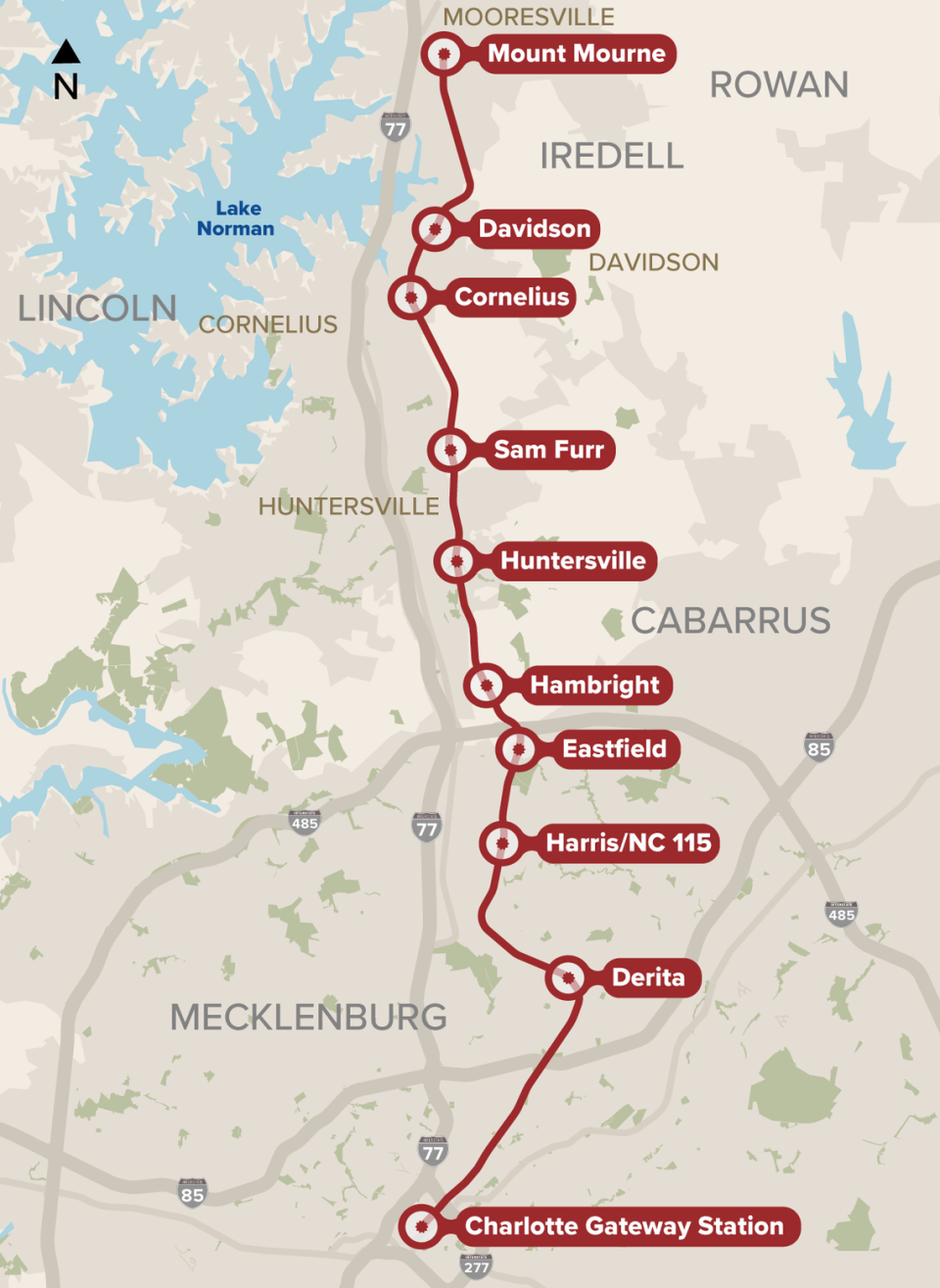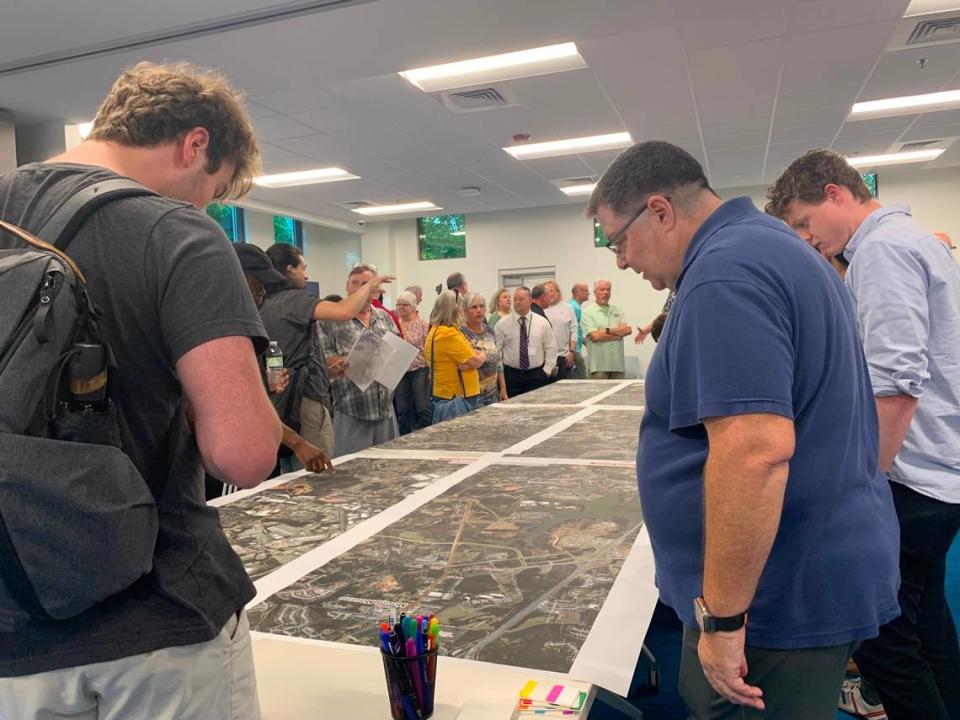‘Nowhere near a done deal.’ Will lingering distrust scuttle revived CATS Red Line plans?
After years of frustration, some north Mecklenburg residents and leaders are cautiously optimistic their communities could finally get long-stalled commuter rail to Charlotte’s core.
The Charlotte Area Transit System held a series of community meetings this month as part of a plan to update the original LYNX Red Line proposal. The plan — a 25-mile commuter rail line running from uptown Charlotte to Huntersville, Cornelius, Davidson and Mooresville first proposed in 2008 — sat stagnant for years due to a lack of access to critical railroad tracks and uncertainty about how to fund the project.
But Norfolk Southern, which owns the tracks, finally agreed to negotiate with transit officials last year, bringing renewed interest to the Red Line. Now, CATS is looking for public input as it takes a fresh look at the approach.
“Once that negotiation is over, we want to hit the ground running. And so much has changed since that last iteration that we need to kind of look at all the stations again, look at all the new vehicle technology out there,” said Brian Nadolny, CATS’ senior project manager for the Red Line. “Everything needs to be updated.”
Still, old questions and skepticism remain about the plan and its feasibility.
“We’re starting all over again,” north Charlotte resident Thomas Templeton said at Thursday’s community meeting in Huntersville.
What’s the status of the Red Line?
The saga of expanding mass transit in the Charlotte region, including northern Mecklenburg County, has roots in the late 1990s.
Mecklenburg County voters in 1998 approved a half-cent sales tax to finance public transportation systems. In 1999, Mecklenburg County, Charlotte, Davidson, Huntersville, Cornelius, Pineville, Matthews and Mint Hill signed onto the “Transit Governance Interlocal Agreement” and formed the Metropolitan Transit Commission to help govern CATS.

The Red Line plan wasn’t formally introduced until 2008, and Norfolk Southern’s unwillingness to grant CATS access to the “O Line” — a set of rarely used freight tracks — stalled the idea.
Local leaders also have failed to develop a viable plan to fund the Red Line and other major transit projects. Charlotte has discussed trying to get a sales tax increase on the ballot for transportation needs, but the city needs General Assembly approval to do so. Republican leaders in Raleigh have yet to be won over.
The additional transit-related tax has drawn opposition from north Mecklenburg leaders, who said their communities won’t pay more into a system they feel has failed to deliver.
“You’ve already bait-and-switched the electorate. The trust, which is what all this is predicated on, is totally broken,” Jeff Tarte, the former mayor of Cornelius and a former state senator, told the Observer in 2021.
But there was good news in in October when Charlotte leaders confirmed Norfolk Southern was finally “willing to consider engaging” about O Line access, the Observer reported previously.
What does community want in Red Line plan?
Templeton, who lives in north Charlotte’s Derita neighborhood that’s slated to get a Red Line stop, recalls hearing about north Mecklenburg transit needs for 30 years.
“I’ve seen a lot of these plans before,” he said at Thursday’s community meeting at the North County Regional Library, where residents met with CATS staff and looked over the existing Red Line plan.
Templeton said he’s eager to hear what other residents have to say about the Red Line and whether more stops in Charlotte will be added south of his home.
“I hope they do that because I think that would be a missed opportunity if they did not,” he said.
Latoya McCombs is a resident of Huntersvile’s Pottstown neighborhood, a historically Black community situated close to the desired tracks. McCombs said she wants to learn more about environmental and public safety impacts before deciding whether she’s in favor of the plan.
“I was telling my friend, ‘It’s gonna be behind your house and in front of my house,’” she said of the proposed train route.
She also wants to see CATS rename the project given the historical connotations around “red lining” — the historical practice of blocking African-American communities from getting loans to buy homes.

Other residents mentioned the same suggestion on feedback boards at Thursday’s community meeting. People left notes saying they want to learn more about noise pollution, environmental impacts and how the plan will be paid for.
Attendees also left stickers indicating how they’d use the Red Line. The most popular choices were for work, “retail shopping or leisure” and to get to uptown Charlotte for events such as sports or concerts.
Could Camp North End be added to the Red Line?
Alex Wohlbruck, who described himself as a big advocate “for transit and cycling projects,” said he’d like to see a station added at Camp North End. The 76-acre site is home to food stalls and shops. It frequently hosts events, too.
“That would be a huge miss if they didn’t include that,” he said.
The idea of a Red Line station in the vicinity of the entertainment venue emerged during discussions in the 2010s about North End development, developer Damon Hemmerdinger told the Observer.
“My understanding was that there was talk at that time about the fact that if the city and both the public sector and the civic sector wanted economic development to occur in Charlotte’s north end, if the Red Line was to happen, that adding a stop would make sense,” he said.

Hemmerdinger said Camp North End has “expressed support to the city” about a Red Line stop at or near the site and that he’s met with CATS in the last six months to talk about it.
“I think the economic development impacts and the convenience and livability and kind of desirability of working near a transit stop are not questioned really by anybody,” he said. “And so I think it would have a tremendously positive impact on anybody living anywhere in the north end, anybody working anywhere in the north end.”
Is there regional unity around transit?
It’s not just residents and developers. North Mecklenburg leaders are paying close attention to what’s on the table for the Red Line.
Mecklenburg County Commissioner Elaine Powell, whose District 1 includes north Mecklenburg, said transit distrust still lingers in her community.
“There is some excitement that something might come through, but there’s much more distrust. The trust was shattered since nothing’s been done in the last 25 years,” she said.

Powell said she wants to see a local agreement all north Mecklenburg mayors can get behind before she throws her support behind the revived Red Line plan.
“No one’s gonna pressure me into agreeing to anything without a strong interlocal agreement … It’s really important to me that we’re all unanimous together,” she said.
At Thursday’s community meeting, Huntersville Mayor Christy Clark said the turnout seemed like a sign the community is interested in moving forward with the Red Line. She expressed optimism about regional unity.
“There will be a regional transit authority within my lifetime of living in Huntersville. That’s a necessity,” she said. “... We’re going to unite together to get things done from now on.”
Davidson Mayor Rusty Knox said he also saw enthusiasm at an earlier meeting in his town.
“I was pleasantly surprised,” he said.
Knox, who is vice chairman of the MTC, said local leaders are “further along than we’ve been in 20 years” on the Red Line. But that doesn’t mean things will happen quickly, he added.
“You still have to figure out how to pay for it,” he said. “.... This is nowhere near a done deal.”
What’s next for the Red Line
As negotiations over track access continue with Norfolk Southern, Nadolny said his team will incorporate feedback from the community into the redesign of the Red Line. Once that design update is done, the new plan will be presented to the public.
Clark said she’s eager to see the updated plan and hopeful public interest in the planning process is a sign progress is coming about how to fund the project.
“I think what these kinds of events are demonstrating is that people will want to have the sales tax,” she said.
Knox wants to see the designers keep in mind the growth that’s already happened in north Mecklenburg and changes in commuting habits as they rework the Red Line Plan.
Clark, a former state legislator, said she could see a General Assembly compromise that would put money towards both rail and roads.
Powell said she’s “cautiously optimistic” about progress but remains committed to getting an interlocal agreement after hearing from many constituents who’ve felt “hoodwinked” in the past.
“We have to protect the voices of our towns. And they haven’t been protected,” she said.
In our CLT Politics newsletter, we offer exclusive insight into Charlotte-region politics sent to your inbox on Thursdays. Subscribe for free. Story idea? mramsey@charlotteobserver.com.

